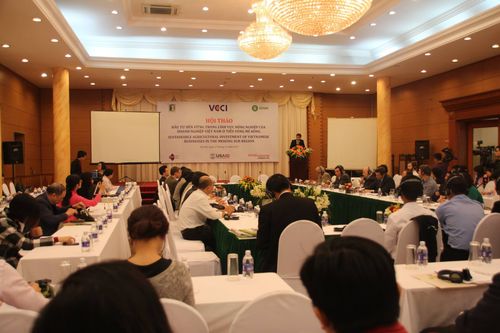A representative from PanNature suggested clearly defining the non-profit status of science and technology organizations to facilitate research, technology transfer, and application. This clarity would also enhance international collaboration and attract funding.

Firms to observe laws when investing abroad
Experts urged Vietnamese businesses to comply with established laws and attach special attention to environmental protection and corporate social responsibility when investing abroad, considerations that are all said to be vital for sustainable investment.
Speaking at a Friday conference titled “Sustainable agriculture investment of Vietnamese businesses in the Mekong sub-region”, ??u Anh Tu?n, head of the Vi?t Nam Chamber of Commerce and Industry (VCCI)’s Legal Department, said businesses need to have reliable sources of information to make careful preparation for their overseas investment projects.
“Now, firms should not only comply with laws but also focus on CSR and environment protection to shift towards sustainable values,” Tu?n said.

According to ?oàn Thanh Ngh? from the Ministry of Planning and Investment’s Foreign Investment Agency, Laos and Cambodia are major destinations for Vietnamese investments.
Ngh? cited the ministry’s statistics: as of January, Vietnamese firms poured a total of nearly US$21.4 billion into more than 1,190 projects in 70 countries and territories. Laos ranked first with 270 projects, worth $5.12 billion, followed by Cambodia with 191 projects, worth $2.89 billion.
Ngh? said that overseas Vietnamese investments are mainly poured into agriculture, telecommunications and mining, which serve to Vi?t Nam’s advantage for cooperation with Laos and Cambodia.
In order to promote Vietnamese investments in Laos and Cambodia, Ngh? said that information exchanges must be improved together and the transparency and stability of the business climate must be enhanced.
In addition, the negotiation and signing of bilateral and multilateral cooperation agreements must be sped up to create favourable investment conditions.
Ph?m Quang Tú, a representative from Oxfam Vi?t Nam said that the organisation’s research found that there were a number of bottlenecks in implementing investment projects in Laos and Cambodia, such as issues related to land ownership, labour, conflicts in compensation and difficulties in contacting local authorities.
Tú said that policies and instructions to encourage Vietnamese firms to pay attention to CSR when investing overseas.
He added that countries which received investments should develop a database with regular updates to provide reliable information to investors.
A research group of PanNature, VCCI and Oxfam was drafting instructions for Vietnamese businesses to invest in agriculture overseas, which aimed to reduce risks in investing and build the image of Vietnamese investors in particular and the national image in general.
The instruction included regulations in investing abroad, foreign investment attraction policies of destination countries as well as social and environmental issues arising from investment



